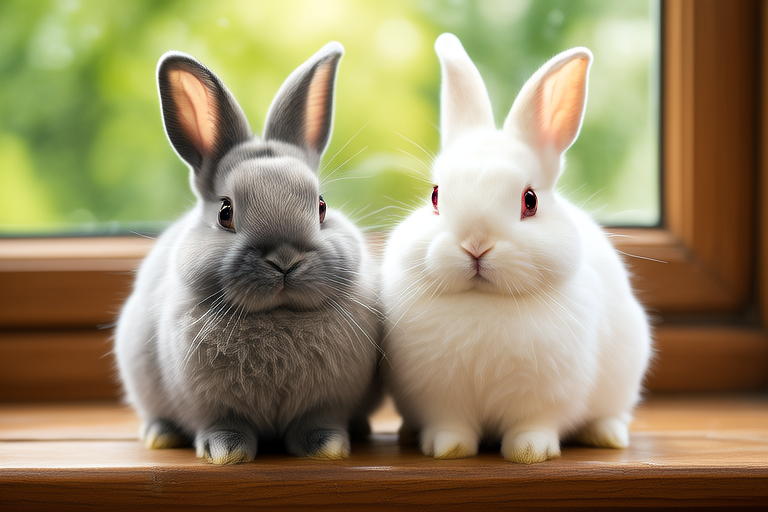Adorable Dutch Dwarf Rabbits: The Perfect Pet for Small Spaces
Dutch Dwarf rabbits are a popular breed among rabbit enthusiasts for their small size, charming appearance, and gentle temperament. These adorable creatures are ideal for individuals living in smaller spaces or apartment dwellers who seek a pet that is both low maintenance and highly affectionate. In this article, we will explore why Dutch Dwarf rabbits make perfect pets for small spaces, delving into their unique characteristics, care requirements, and the rewarding companionship they offer.
The Appeal of Dutch Dwarf Rabbits
One of the most endearing features of Dutch Dwarf rabbits is their petite size. Typically weighing between 1.5 to 2.5 pounds, they are significantly smaller than many other rabbit breeds, making them well-suited for homes with limited space. Their charming appearance, characterized by their round faces, short ears, and large eyes, adds to their appeal. Dutch Dwarfs come in a variety of colors and markings, offering a range of options for potential owners to choose from.
Despite their small size, Dutch Dwarf rabbits have a gentle and docile temperament, which makes them easy to handle and interact with. They are known for their calm demeanor, making them excellent companions for children and adults alike. Their friendly nature and ease of handling make them ideal for first-time rabbit owners or families looking for a pet that can be easily integrated into daily life.
Suitability for Small Spaces
Dutch Dwarf rabbits require minimal space compared to larger breeds, making them an excellent choice for apartment living or homes with limited square footage. While they need ample room to move around and exercise, their relatively small size means they can thrive in a well-designed living environment. Providing a spacious cage or hutch indoors or outdoors is essential, but it does not have to take up too much room.
Housing solutions for Dutch Dwarf rabbits can vary depending on the owner’s preferences and available space. An indoor cage with enough room for the rabbit to stand up on its hind legs without touching the top and move around comfortably is a good starting point. Additionally, incorporating tunnels, platforms, and toys can help enrich their living environment and provide mental stimulation. For outdoor housing, a weatherproof hutch with a secure run area allows the rabbit to enjoy fresh air and natural sunlight.
These rabbits have a minimal impact on living environments due to their small size and low-maintenance care routine. They produce less waste than larger breeds, making litter box training easier and more effective. With proper care, Dutch Dwarf rabbits can be kept in small spaces without causing significant disruptions or requiring extensive cleaning.
Dietary Needs and Grooming Routines
Feeding Dutch Dwarf rabbits a balanced diet is crucial for maintaining their health and well-being. A high-quality hay, such as timothy hay, should form the bulk of their diet. Fresh vegetables, including leafy greens like romaine lettuce and spinach, can be offered in moderation. It is important to introduce new foods gradually to avoid digestive upset. Pellets formulated specifically for rabbits should also be provided in limited quantities, as overfeeding can lead to obesity.
Grooming Dutch Dwarf rabbits is relatively simple, thanks to their short, dense coats. Regular brushing with a soft brush helps remove loose fur and prevent matting. Bathing is generally unnecessary unless the rabbit gets particularly dirty. During grooming sessions, it is also an opportunity to check for any signs of illness or injury, ensuring early detection and prompt treatment.
Common Health Issues
Like all animals, Dutch Dwarf rabbits are susceptible to certain health issues. Dental problems, including malocclusion (misalignment of teeth), are relatively common and can cause pain and difficulty eating. Ensuring a diet rich in fibrous hay and providing chew toys can help maintain dental health. Other potential health concerns include respiratory infections, gastrointestinal stasis, and skin conditions. Regular veterinary check-ups and a healthy lifestyle can help minimize the risk of these issues.
Interacting with and Training Your Rabbit
Building a strong bond with your Dutch Dwarf rabbit involves consistent interaction and positive reinforcement. Spend time with your rabbit daily, allowing them to become comfortable with handling and petting. Gentle play sessions and training exercises, such as teaching basic commands or tricks, can enhance the relationship and provide mental stimulation. Training should always be conducted in a positive manner, using treats and praise to encourage desired behaviors.
Dutch Dwarf rabbits are intelligent and capable of learning various tricks and commands. Basic training, such as coming when called or using a litter box, can be achieved through patience and consistency. Interactive toys and puzzles designed for rabbits can also aid in mental stimulation and prevent boredom. Engaging with your rabbit regularly will strengthen the bond and ensure a rewarding companionship.
Summary: Why Dutch Dwarf Rabbits Are Ideal Pets
In conclusion, Dutch Dwarf rabbits are the perfect pets for those looking for a low-maintenance, affectionate companion suitable for small spaces. Their small size, gentle temperament, and minimal space requirements make them ideal for apartment living or homes with limited square footage. With proper care, including a balanced diet, regular grooming, and adequate attention, Dutch Dwarf rabbits can thrive in a variety of environments.
By providing a suitable living space, meeting their dietary needs, and engaging in regular interaction and training, you can ensure a happy and healthy life for your Dutch Dwarf rabbit. The rewarding companionship and affection they offer make them an excellent choice for individuals seeking a loving pet that requires minimal upkeep. Whether you’re a first-time pet owner or an experienced animal lover, Dutch Dwarf rabbits are sure to bring joy and companionship into your home.
